ANGLE OF INCLINATION AND SLOPE OF A LINE
Subscribe to our ▶️ YouTube channel 🔴 for the latest videos, updates, and tips.
Let a straight line l intersect the x - axis at A. The angle between the positive x - axis and the line l, measured in counter clockwise direction is called the angle of inclination of the straight line l.
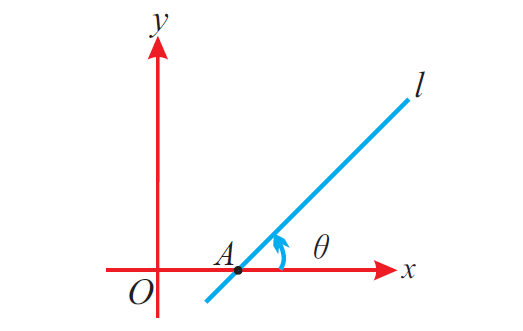
In the above figure, If θ is the angle of a straight line l, then we have the following important points.
(i) 0° ≤ θ ≤ 180°
(ii) For horizontal lines, θ = 0° or 180° and for vertical lines, θ = 90°
(iii) If a straight line initially lies along the x-axis and starts rotating about a fixed point A on the x-axis in the counter clockwise direction and finally coincides with the x-axis, then the angle of inclination of the straight line in the initial position is 0°and that of the line in the final position is 0°.
(iv) Lines which are perpendicular to x-axis are called as vertical lines.
(v) Lines which are perpendicular to y-axis are called as horizontal lines.
(vi) Other lines which are neither perpendicular to x- axis and nor to y-axis are called as slant lines.
Angle of Inclination and Slope of a Line - Application
The major application of angle of inclination of a straight line is finding slope.
If θ is the angle of inclination of a straight line l, then tanθ is called the slope of gradient of the line is denoted by "m".
Therefore, the slope of the straight line is
m = tan θ
for 0° ≤ θ ≤ 180°
Let us find the slope of a straight using the above formula
(i) For horizontal lines, the angle of inclination is 0° or 180°.
That is,
θ = 0° or 180°
Therefore, slope of the straight line is
m = tan0° or tan 180° = 0
(ii) For vertical lines, the angle of inclination is 90°.
That is
θ = 90°
Therefore, slope of the straight line is
m = tan90° = Undefined
(iii) For slant lines, if θ is acute, then the slope is positive. Whereas if θ is obtuse, then the slope is negative.
Slope of a line - Positive or Negative or Zero or Undefined
When we look at a straight line visually, we can come to know the sign of the slope easily.
To know the sign of slope of a straight line, always we have to look at the straight line from left to right.
The figures given below illustrate this.
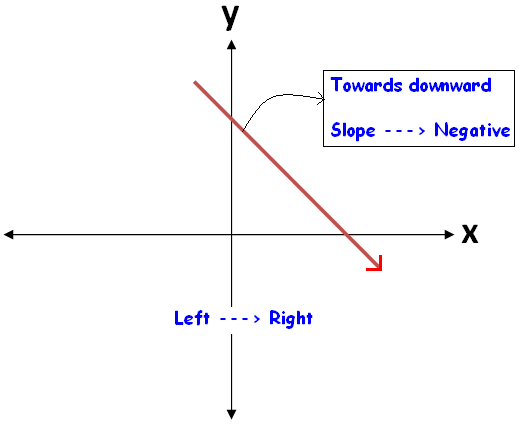
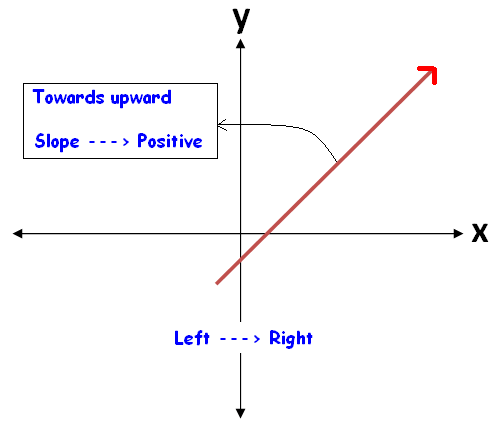
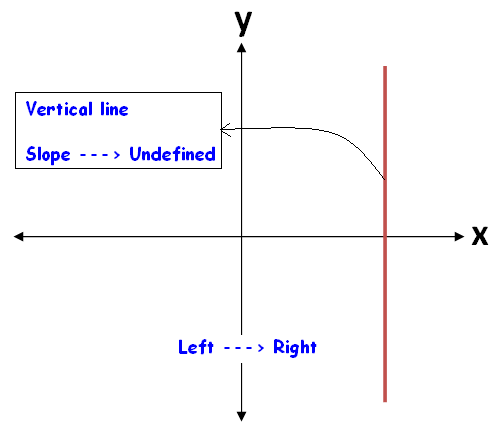
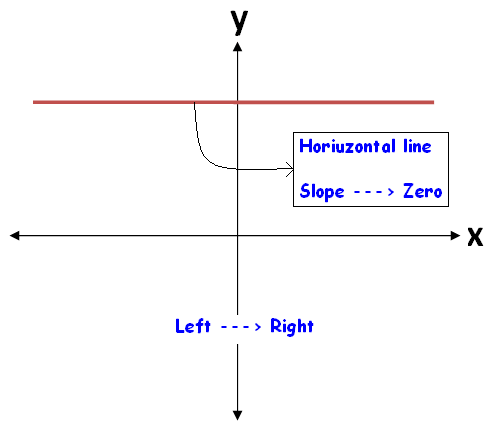
Solved Problems
Problem 1 :
Find the angle of inclination of the straight line whose slope is 1/√3.
Solution :
Let θ be the angle of inclination of the line.
Then, slope of the line is
m = tanθ
Given : Slope = 1/√3
Then,
1/√3 = tanθ
θ = 30°
So, the angle of inclination is 30°.
Problem 2 :
If the angle of inclination of a straight line is 45°, find its slope.
Solution :
Let θ be the angle of inclination of the line.
Then, slope of the line,
m = tanθ
Given : θ = 45°
Then,
m = tan 45°
m = 1
So, the slope is 1.
Problem 3 :
If the angle of inclination of a straight line is 30°, find its slope.
Solution :
Let θ be the angle of inclination of the line.
Then, slope of the line,
m = tanθ
Given : θ = 30°
Then,
m = tan30°
m = 1/√3
So, the slope is 1/√3.
Problem 4 :
Find the angle of inclination of the straight line whose slope is √3.
Solution :
Let θ be the angle of inclination of the line.
Then, slope of the line,
m = tanθ
Given : Slope = √3
Then,
√3 = tanθ
θ = 60°
So, the angle of inclination is 60°.
Problem 5 :
Find the angle of inclination of the straight line whose equation is y = x + 32.
Solution :
Let θ be the angle of inclination of the line.
The given equation is in slope intercept form.
That is,
y = mx + b
Comparing
y = x + 32
and
y = mx + b,
we get the slope m = 1.
We know that the slope of the line is
m = tanθ
Then,
1 = tanθ
θ = 45°
So, the angle of inclination is 45°.
Subscribe to our ▶️ YouTube channel 🔴 for the latest videos, updates, and tips.
Kindly mail your feedback to v4formath@gmail.com
We always appreciate your feedback.
About Us | Contact Us | Privacy Policy
©All rights reserved. onlinemath4all.com

Recent Articles
-
The 15 Hardest SAT Math Questions Ever
Feb 03, 26 10:47 AM
The 15 Hardest SAT Math Questions Ever -
25 of the Hardest SAT Math Questions
Feb 03, 26 10:30 AM
25 of the Hardest SAT Math Questions -
SAT Math Practice Problems with Answers
Feb 03, 26 06:24 AM
SAT Math Practice Problems with Answers


